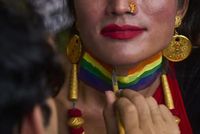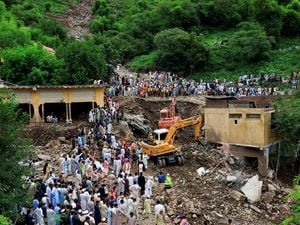On August 10, 2025, the streets of Kathmandu burst into a kaleidoscope of color, music, and pride as Nepal’s LGBTQ+ community and its allies gathered for the nation’s annual Pride rally. This year’s event, held during the famed Gai Jatra festival, was more than just a celebration—it marked a poignant comeback after a period of hardship brought on by a major funding crisis.
Hundreds of marchers, clad in rainbow hues, wound their way through the heart of the capital, dancing and singing as they honored both their lost loved ones and their hard-won rights. The Gai Jatra festival, traditionally a time to remember family members who have passed away, has in recent years become a platform for Nepal’s sexual minorities to step forward in joyful, unapologetic solidarity. But beneath the revelry, there was an undercurrent of resolve and a call for renewed support.
The significance of this year’s rally was underscored by the fact that it was the first since a seismic shift in international aid left the community reeling. According to The Associated Press, the Trump administration’s decision to dismantle the U.S. Agency for International Development (USAID) programs in Nepal led to a sudden cessation of U.S. government aid, which had long been the backbone of many LGBTQ+ support initiatives in the country.
USAID, over the years, had been a lifeline for Nepal’s LGBTQ+ population, funding crucial services such as HIV prevention, safe-sex counseling, and healthcare. These programs not only provided free condoms, screenings, and follow-up treatments for people living with HIV, but also underpinned community centers that served as safe havens for thousands. The abrupt closure of the USAID office in Nepal forced most of these centers to shut their doors, leaving many without the assistance they had come to rely on.
“Because of the cut in funding many of the services we have been providing to the community have been hit badly, but we are not discouraged. We are hopeful we will get alternative sources and fundings to help us restart those services,” said Simran Sherchan, a prominent LGBTQ+ rights activist, while attending the rally. Sherchan’s words, reported by The Associated Press, echoed the resilience and determination felt by many in attendance.
The impact of the U.S. funding withdrawal has been profound. As detailed by Travel Daily Media, the support from USAID and its partners was vital in running centers and clinics that not only distributed free preventive resources but also provided critical screenings and ongoing care for those affected by HIV. The sudden loss of these services has left a void that, for now, remains unfilled.
Yet, the rally itself was a testament to the community’s spirit. Participants not only celebrated their identities but also sent a clear message: Nepal’s LGBTQ+ community is not giving up. The event was both an affirmation of progress made and a rallying cry for the future. Activists called on local and international donors to step in and help sustain the vital services that are now at risk.
Despite recent setbacks, Nepal stands out as a beacon of progress on LGBTQ+ rights in Asia. As The Associated Press and Travel Daily Media both report, the country has made significant strides in recent years. Nepal is one of the few Asian nations to have legalized same-sex marriage, a milestone that places it at the forefront of the region’s human rights movement. Moreover, the 2015 constitution enshrined protections against discrimination based on sexual orientation, sending a powerful signal of inclusion and equality.
The journey to these achievements has not been easy. For years, activists and allies fought against entrenched social norms and legal barriers. The support of international partners, especially the United States through USAID, was instrumental in building the infrastructure needed to advance LGBTQ+ rights and provide essential health services. The loss of this support, therefore, has been particularly painful.
According to The Associated Press, the closure of most community support centers following the funding cuts left thousands of people without assistance. These centers were not just places to access healthcare; they were safe spaces where individuals could seek counseling, build community, and find acceptance. Their absence has been keenly felt, especially among the most vulnerable members of the LGBTQ+ population.
Nevertheless, activists like Simran Sherchan remain undeterred. “We are hopeful we will get alternative sources and fundings to help us restart those services,” Sherchan reiterated, emphasizing a determination to overcome adversity. The rally, while celebratory, was also a plea for solidarity—from within Nepal and from the international community.
The timing of the rally, coinciding with the Gai Jatra festival, added layers of meaning. Traditionally, Gai Jatra is a time of remembrance and mourning, but in recent years it has also become a moment for marginalized communities to assert their presence and demand recognition. The inclusion of LGBTQ+ parades in the festival’s festivities has transformed it into a vibrant display of diversity and acceptance, even as challenges persist.
For many participants, the rally was both a celebration of how far Nepal has come and a reminder of how much work remains. While legal protections are in place, the loss of critical funding has exposed the fragility of progress. Sustaining the gains of the past decade will require not only new sources of funding but also ongoing advocacy, both at home and abroad.
Local organizations are now scrambling to identify alternative donors and partners who can help bridge the gap left by USAID’s departure. Some are looking to private foundations, while others are appealing to the Nepali government to step up its support. There is also hope that renewed international attention—spurred by the high-profile nature of the rally—will lead to new partnerships and resources.
The story of Nepal’s LGBTQ+ community is one of resilience, hope, and the relentless pursuit of equality. As the music faded and the crowds dispersed, the message was clear: setbacks may slow progress, but they will not stop it. The community’s determination to rebuild its support structures and continue the fight for full equality remains as strong as ever.
With Nepal’s legal framework offering rare protections in the region, and with activists refusing to be discouraged, the future of LGBTQ+ rights in the country still holds promise—if new support can be found to replace what was lost.




